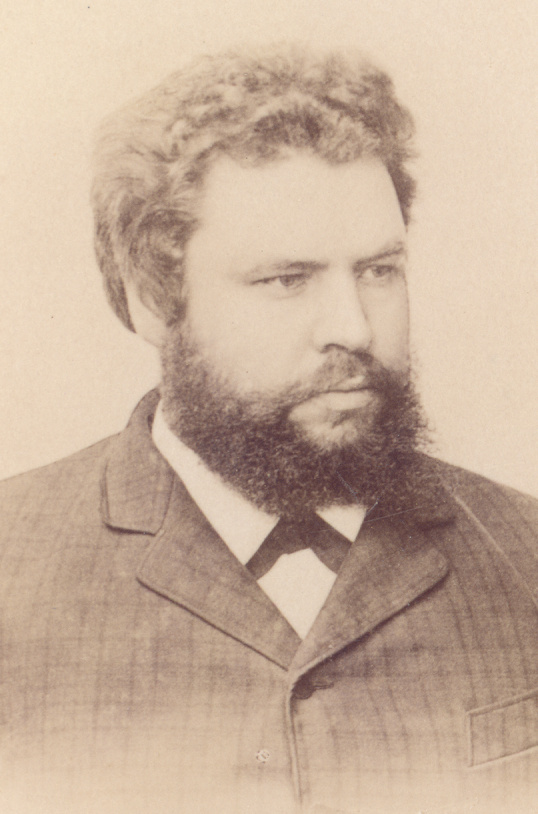
Jakob Tamm
Jakob Tamm (1861 – 1907) was an Estonian poet and translator. The better part of his works diversified the literature of the late 19th century with its realistic and epic poetry based on folklore, as well as with his translations of the classics of Russian and German literature.
Jakob Tamm was born in Vastse-Nõo parish in Tartu county, the son of a farmhand. He attended the Teachers’ Seminary number II in Tartu, where his lasting interest in Russian and German literature was kindled. He graduated cum laude, and in 1883 began working as a teacher: firstly at Adavere, then at Pilistvere and finally at the Alexander School in Põltsamaa. From 1893 until the end of his life Jakob Tamm was the headmaster of the Väike-Maarja parish school. A.H.Tammsaare was one of his pupils at the school. Jakob Tamm became an active figure in popular education, and belonged to a local literary group which came to be called the Parnassus of Väike-Maarja.
Jakob Tamm’s poetry started appearing in journals in 1882. In 1892 Ärganud Hääled (‘Awakened Voices’) I and II appeared, consisting of the poet’s original and translated poems from his earliest creative period (1881-1886). These were the only collections to be published by Jakob Tamm himself. Some of his later work saw the light of day in the pages of journals and school textbooks, some remained in manuscript, only being read posthumously.
Jakob Tamm’s work proceeds on the one hand from impressions from his immediate environment and on the other from the material of folklore. He created original texts, both emotional and narrative verse. Jakob Tamm’s early work was akin to the national-romantic style. Although as a lyricist he dealt with subjects typical for his time – love, nature, the home and so on – some of the poems are prominent for their poetic language and technical diversity. Jakob Tamm developed the theme of love in many sonnets. A striking proportion of his lyrics are expressed in realistic imagery (the cycle of poems Musta aja mälestused, ‘Memories of a Dark Time’). His poems for children are also highly regarded (the cycle Hällilt elule, ‘From the Cradle to Life’).
From the viewpoint of the development of poetry, however, Jakob Tamm’s achievement in the lyrical epic are seen as his most significant. In the narrative poetry there is material of folk origins, which is developed in a diverse way for the genre. The poet was able to bring to life characters and situations and apply the weight of demotic language to his ballads (Orjakivi, ‘The Slave Stone’; Odavad orjad, ‘Cheap Slaves’, and others). He successfully put into verse several fairy-tales and legends (Kuldking, ‘The Golden Shoe’) and other mysterious tales (Suits Ebavere mäel, ‘Smoke on Ebavere Hill’). Also noteworthy are his verse pieces based on village life (Ahervars, ‘A Ruin’). Jakob Tamm also wrote widely applicable fables (Punik, ‘The Red Cow’, and Siga, ‘The Pig’). In his most mature work he united subject-matter rooted in folk material with realistic descriptions of situations, with motifs from everyday life, and his narrative songs also contain social criticism.
Jakob Tamm translated the works of authors significant in his time – Schiller, Goethe, Heine and other great figures of German literature. Through his translations the works of Russian classic authors also began to reach Estonian readers for the first time, enriching the thitherto German-based background of Estonian literature. Jakob Tamm put into the Estonian language Russian folk-songs, Pushkin’s poems, Krylov’s fables, part of Tolstoy’s ‘War and Peace’, as well as works by Lermontov, Gorky, Koltsov, Nekrasov and others. These translations were seen as part of the diversification of Estonian verse culture at the end of the 19th century.
I. S. (Translated by C. M.)
Books in Estonian
Ärganud hääled. I-II anne. Luuletanud Jakob Tamm. Tartu: K. A. Hermann, 1892, 103+98 lk.
Jakob Tamme Lugulaulud. Tartu: EKS Rahvakirjanduse Toimekond, 1914, 495 lk.
Ballaadid ja valmid. Tallinn: Eesti Riiklik Kirjastus, 1951, 95 lk.
Kogutud luuletused. Koostanud Richard Alekõrs. Tallinn: Eesti Riiklik Kirjastus, 1959, 974 lk.
Jakob Tamm. Koostanud Kersti Merilaas. Tallinn: Eesti Raamat, 1965, 80 lk. [Sari ‘Väike luuleraamat’.]
Ussipealik. Valimik luuletusi, ballaade, valme. Koostanud ja järelsõna: Edvin Hiedel. Tallinn: Eesti Raamat, 1988, 46 lk.
About Jakob Tamm
Richard Alekõrs, Jakob Tamm. – Tallinn: Eesti Riiklik Kirjastus, 1961, 112 lk.
Richard Alekõrs, Jakob Tamm: ühe inimese elu ja töö lugu. Tallinn: Eesti Raamat, 1978, 381 lk.



